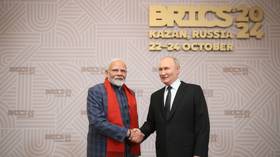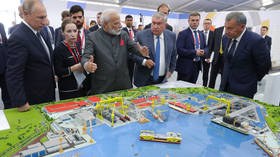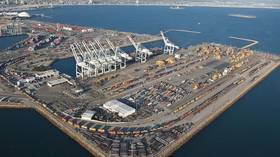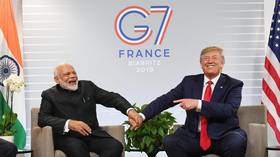Strategic choice: How India navigates oil diplomacy with Russia

In a world where energy security is critical, India’s partnership with Russia stands as a strategic choice. Despite Western sanctions, Russia’s vast energy resources, offered at competitive prices, have become vital for India’s economy.
This alliance underscores India’s energy diversification goals and its ability to navigate complex geopolitics.
India’s energy strategy with Russia balances international diplomacy with the practical needs of a growing economy, and shows a pragmatic approach to securing its energy future. This partnership goes beyond economic transactions, representing a strategic maneuver in the global political landscape, in which energy security is a key element.
Before the Ukraine conflict escalated in February 2022, India and Russia already had a longstanding partnership, supported by reliable supplies, long-term contracts, and infrastructure investments such as the acquisition of Essar Oil by a consotiumum led by Russia’s state-owned Rosneft that fueled India’s economic growth.
The alliance between the two nations endured geopolitical shifts such as the Cold War and market volatility, laying a strong foundation for the current relationship.
After Western countries imposed sanctions on Moscow, this partnership deepened. Despite pressure from Washington and Brussels, India has maintained strong energy ties with Russia, leveraging BRICS to circumvent sanctions and stabilize oil markets. India’s energy imports from Russia diversified, including discounted crude oil, driving bilateral trade well above the $30 billion target for 2025. Through alternative payment systems and bilateral agreements, India has secured its energy needs amid global changes. Both nations now aim to boost trade from current $66 billion to $100 billion by 2030, highlighting the strength of their alliance despite geopolitical challenges.
Russia has become a cornerstone of India’s energy diversification strategy. By 2023, Russia supplied nearly 40% of India’s crude oil imports, reducing India’s reliance on the volatile Middle East and strengthening its energy security and economic stability.
The economic benefits of discounted Russian oil have been significant. In 2023, India saved around $2.7 billion on oil imports, cushioning against global price fluctuations. This cost-effective approach has supported economic growth, alleviated pressure on India’s trade deficit, and reinforced its energy independence.
This strategic alignment is crucial as India seeks to diversify its energy portfolio, reduce dependence on Middle Eastern oil, and secure a stable, balanced supply that supports sustainable development goals.
BRICS force
The BRICS Summit in Kazan underscored the strategic importance of the India-Russia energy partnership amid evolving global pressures. Through this bloc of developing economies, India and Russia have expanded their energy ties, securing reliable supplies without the constraints of Western sanctions.
BRICS plays a pivotal role, offering India a platform to enhance this partnership beyond bilateral ties. The Kazan Declaration, which emphasizes expanded cooperation in energy security and the transition to cleaner energy, emphasised the importance of reliable global supply chains and stable energy demand are the pillars that have become increasingly critical in today’s volatile geopolitical landscape.
India’s stance on technological neutrality, along with the efficient use of diverse energy sources – including fossil fuels with abatement technologies– aligns well with its broader energy security strategy, positioning it as a pragmatic player in global energy diplomacy.
BRICS+ countries, collectively responsible for approximately 40% of global crude oil production and exports, hold significant leverage in promoting a more balanced international order. By capitalizing on their combined economic strength, BRICS nations can pursue ambitious initiatives like an independent energy trading system that operates outside Western-dominated financial and trading structures. Such a system would not only secure energy supplies for member nations but also establish BRICS+ as a stabilizing force in global energy markets, lessening the impact of sanctions on individual members.
Prospects beyond oil
Looking beyond oil, the future of energy trade within the BRICS+ framework presents a transformative opportunity for sustainable partnerships that benefit all members. The Kazan Declaration emphasized the need for efficient use of diverse energy sources, supporting a just transition to resilient energy systems.
This includes not just fossil fuels with carbon abatement technologies, but also biofuels, natural gas, hydrogen, nuclear energy, renewables, and critical minerals.
For instance, in the face of sanctions and shifting geopolitical alliances, BRICS countries have become key players in securing critical minerals and rare earth elements essential for technological advancements.
Collectively, BRICS controls 72% of global rare earth reserves, with Russia holding vast deposits of nickel, palladium, and other minerals critical to the energy transition. The recent expansion of BRICS to include major oil producers Iran and the UAE strengthens this position.
The BRICS Contact Group on Climate Change and Sustainable Development, part of the Environmental Working Group chaired by Russia in 2024, plays a pivotal role in advancing a BRICS+ partnership focused on sustainable mining practices and energy resource management. Initiatives such as these align with BRICS’ commitment to balancing energy needs with environmental goals, ensuring that the pursuit of energy security does not compromise sustainability.
The BRICS Energy Research Cooperation Platform (ERCP) further strengthens these efforts by fostering collaboration in energy research, policy, and innovation. India and Russia, with their complementary energy portfolios, are ideally positioned to drive forward sustainable energy solutions within the ERCP framework.
India’s growing renewable energy sector, paired with Russia’s expertise in fossil fuels and nuclear energy, presents a unique opportunity for joint research, technology exchange, and policy alignment. Through these strategic collaborations, India and Russia can ensure that BRICS+ continues to play a leading role in securing a stable, sustainable, and diverse energy future.
In the intricate landscape of global energy diplomacy, India’s steadfast partnership with Russia under BRICS reflects a philosophy of resilience and adaptability. As nations navigate the storm of geopolitical shifts, this alliance exemplifies the power of pragmatic cooperation, ensuring energy security while fostering a just transition to a sustainable future.
















